Analysing Organisational Behaviour, Culture, Power, and Motivation
VerifiedAdded on 2023/06/18
|18
|6146
|385
Report
AI Summary
This report provides a comprehensive analysis of organisational behaviour, focusing on how an organisation's culture, politics, and power influence individual and team behaviour and performance, using Tesco as a case study. It critically evaluates the influence of culture, politics, and power, and explores motivational theories to enhance behaviour and team success. The report differentiates between effective and ineffective teams, applies team development theories like Tuckman's stages, and uses the Path-Goal Theory to evaluate organisational behaviour within Tesco, offering justified recommendations for improving business performance and productivity. This student-contributed assignment is available on Desklib, offering valuable insights for students studying organisational behaviour and leadership management.
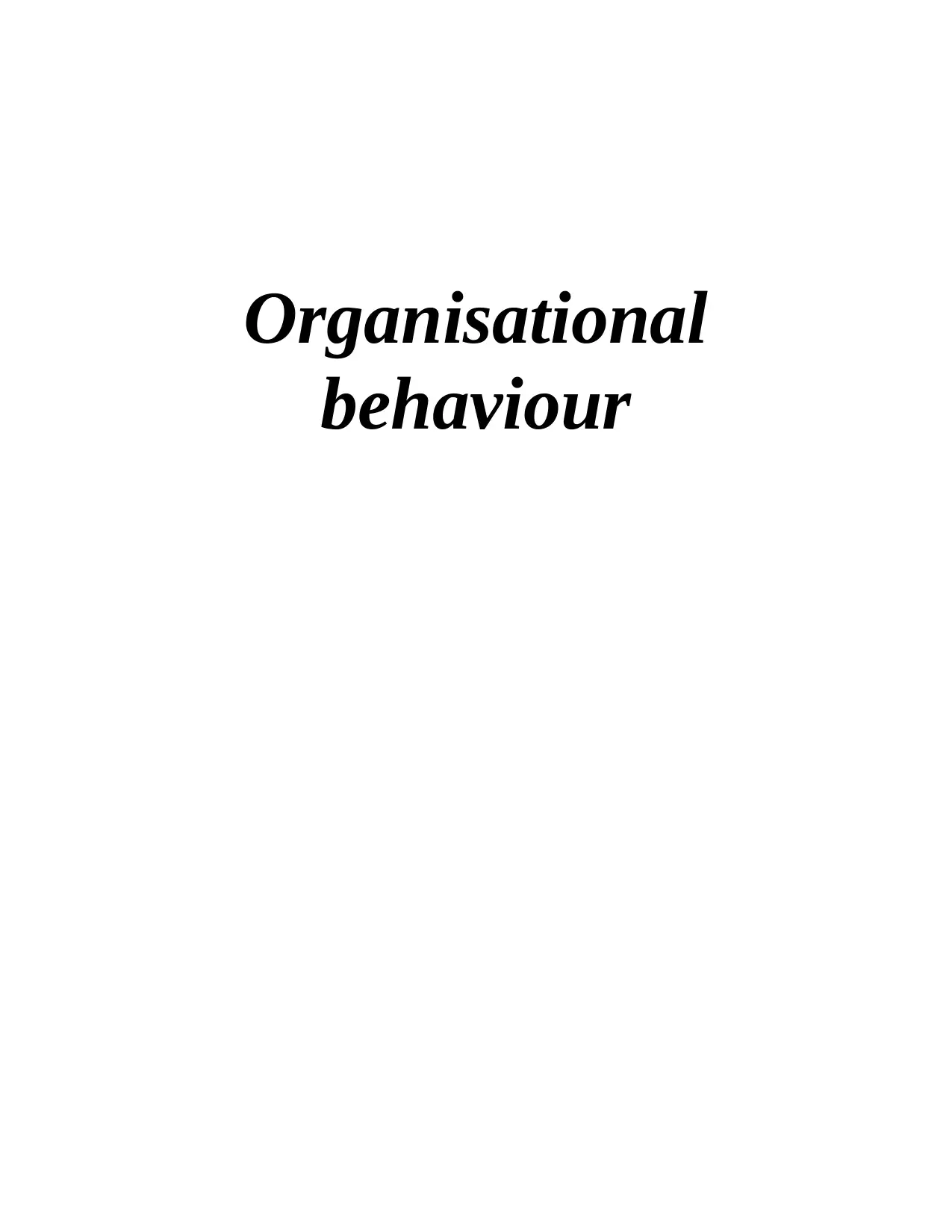
Organisational
behaviour
behaviour
Paraphrase This Document
Need a fresh take? Get an instant paraphrase of this document with our AI Paraphraser
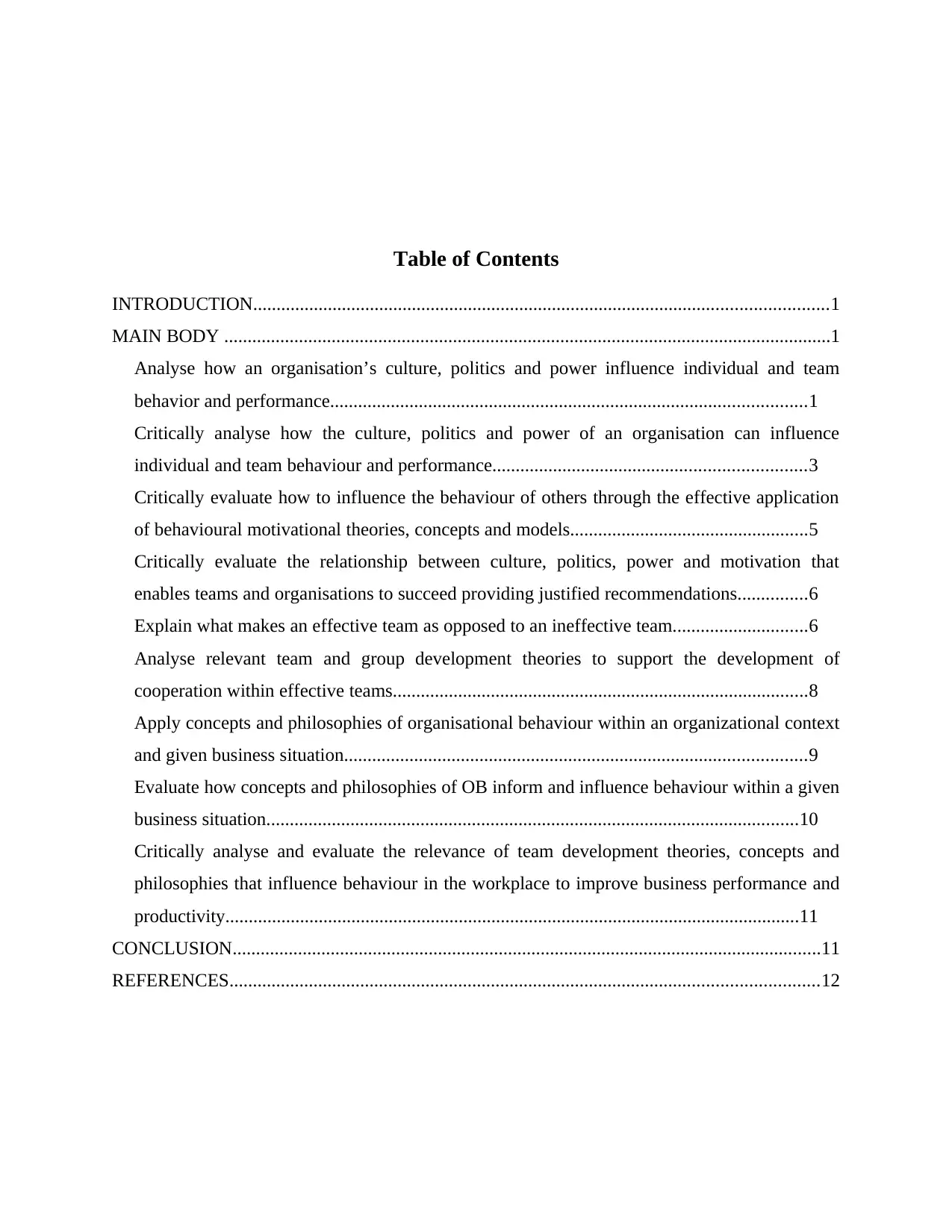
Table of Contents
INTRODUCTION...........................................................................................................................1
MAIN BODY ..................................................................................................................................1
Analyse how an organisation’s culture, politics and power influence individual and team
behavior and performance......................................................................................................1
Critically analyse how the culture, politics and power of an organisation can influence
individual and team behaviour and performance...................................................................3
Critically evaluate how to influence the behaviour of others through the effective application
of behavioural motivational theories, concepts and models...................................................5
Critically evaluate the relationship between culture, politics, power and motivation that
enables teams and organisations to succeed providing justified recommendations...............6
Explain what makes an effective team as opposed to an ineffective team.............................6
Analyse relevant team and group development theories to support the development of
cooperation within effective teams.........................................................................................8
Apply concepts and philosophies of organisational behaviour within an organizational context
and given business situation...................................................................................................9
Evaluate how concepts and philosophies of OB inform and influence behaviour within a given
business situation..................................................................................................................10
Critically analyse and evaluate the relevance of team development theories, concepts and
philosophies that influence behaviour in the workplace to improve business performance and
productivity...........................................................................................................................11
CONCLUSION..............................................................................................................................11
REFERENCES..............................................................................................................................12
INTRODUCTION...........................................................................................................................1
MAIN BODY ..................................................................................................................................1
Analyse how an organisation’s culture, politics and power influence individual and team
behavior and performance......................................................................................................1
Critically analyse how the culture, politics and power of an organisation can influence
individual and team behaviour and performance...................................................................3
Critically evaluate how to influence the behaviour of others through the effective application
of behavioural motivational theories, concepts and models...................................................5
Critically evaluate the relationship between culture, politics, power and motivation that
enables teams and organisations to succeed providing justified recommendations...............6
Explain what makes an effective team as opposed to an ineffective team.............................6
Analyse relevant team and group development theories to support the development of
cooperation within effective teams.........................................................................................8
Apply concepts and philosophies of organisational behaviour within an organizational context
and given business situation...................................................................................................9
Evaluate how concepts and philosophies of OB inform and influence behaviour within a given
business situation..................................................................................................................10
Critically analyse and evaluate the relevance of team development theories, concepts and
philosophies that influence behaviour in the workplace to improve business performance and
productivity...........................................................................................................................11
CONCLUSION..............................................................................................................................11
REFERENCES..............................................................................................................................12
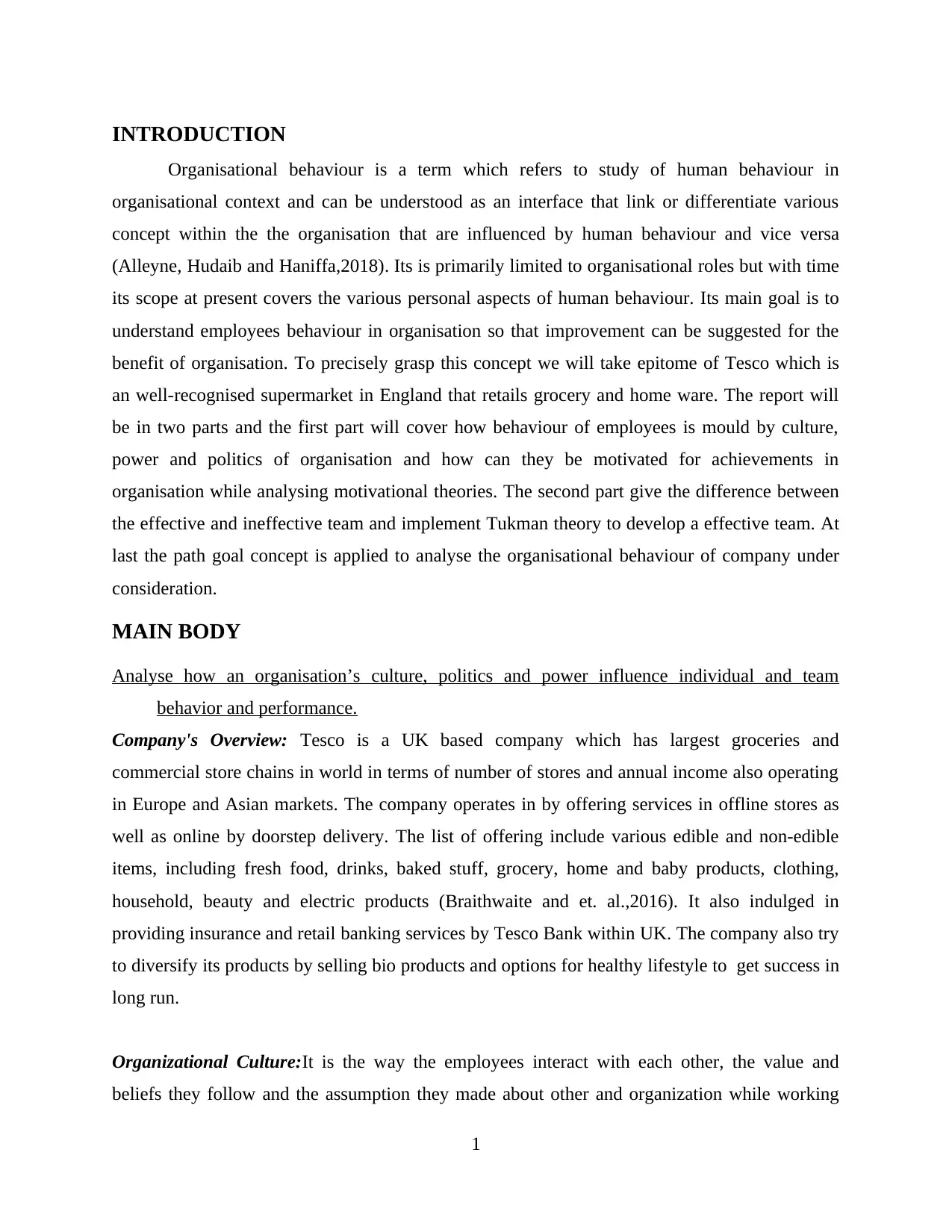
INTRODUCTION
Organisational behaviour is a term which refers to study of human behaviour in
organisational context and can be understood as an interface that link or differentiate various
concept within the the organisation that are influenced by human behaviour and vice versa
(Alleyne, Hudaib and Haniffa,2018). Its is primarily limited to organisational roles but with time
its scope at present covers the various personal aspects of human behaviour. Its main goal is to
understand employees behaviour in organisation so that improvement can be suggested for the
benefit of organisation. To precisely grasp this concept we will take epitome of Tesco which is
an well-recognised supermarket in England that retails grocery and home ware. The report will
be in two parts and the first part will cover how behaviour of employees is mould by culture,
power and politics of organisation and how can they be motivated for achievements in
organisation while analysing motivational theories. The second part give the difference between
the effective and ineffective team and implement Tukman theory to develop a effective team. At
last the path goal concept is applied to analyse the organisational behaviour of company under
consideration.
MAIN BODY
Analyse how an organisation’s culture, politics and power influence individual and team
behavior and performance.
Company's Overview: Tesco is a UK based company which has largest groceries and
commercial store chains in world in terms of number of stores and annual income also operating
in Europe and Asian markets. The company operates in by offering services in offline stores as
well as online by doorstep delivery. The list of offering include various edible and non-edible
items, including fresh food, drinks, baked stuff, grocery, home and baby products, clothing,
household, beauty and electric products (Braithwaite and et. al.,2016). It also indulged in
providing insurance and retail banking services by Tesco Bank within UK. The company also try
to diversify its products by selling bio products and options for healthy lifestyle to get success in
long run.
Organizational Culture:It is the way the employees interact with each other, the value and
beliefs they follow and the assumption they made about other and organization while working
1
Organisational behaviour is a term which refers to study of human behaviour in
organisational context and can be understood as an interface that link or differentiate various
concept within the the organisation that are influenced by human behaviour and vice versa
(Alleyne, Hudaib and Haniffa,2018). Its is primarily limited to organisational roles but with time
its scope at present covers the various personal aspects of human behaviour. Its main goal is to
understand employees behaviour in organisation so that improvement can be suggested for the
benefit of organisation. To precisely grasp this concept we will take epitome of Tesco which is
an well-recognised supermarket in England that retails grocery and home ware. The report will
be in two parts and the first part will cover how behaviour of employees is mould by culture,
power and politics of organisation and how can they be motivated for achievements in
organisation while analysing motivational theories. The second part give the difference between
the effective and ineffective team and implement Tukman theory to develop a effective team. At
last the path goal concept is applied to analyse the organisational behaviour of company under
consideration.
MAIN BODY
Analyse how an organisation’s culture, politics and power influence individual and team
behavior and performance.
Company's Overview: Tesco is a UK based company which has largest groceries and
commercial store chains in world in terms of number of stores and annual income also operating
in Europe and Asian markets. The company operates in by offering services in offline stores as
well as online by doorstep delivery. The list of offering include various edible and non-edible
items, including fresh food, drinks, baked stuff, grocery, home and baby products, clothing,
household, beauty and electric products (Braithwaite and et. al.,2016). It also indulged in
providing insurance and retail banking services by Tesco Bank within UK. The company also try
to diversify its products by selling bio products and options for healthy lifestyle to get success in
long run.
Organizational Culture:It is the way the employees interact with each other, the value and
beliefs they follow and the assumption they made about other and organization while working
1
⊘ This is a preview!⊘
Do you want full access?
Subscribe today to unlock all pages.

Trusted by 1+ million students worldwide
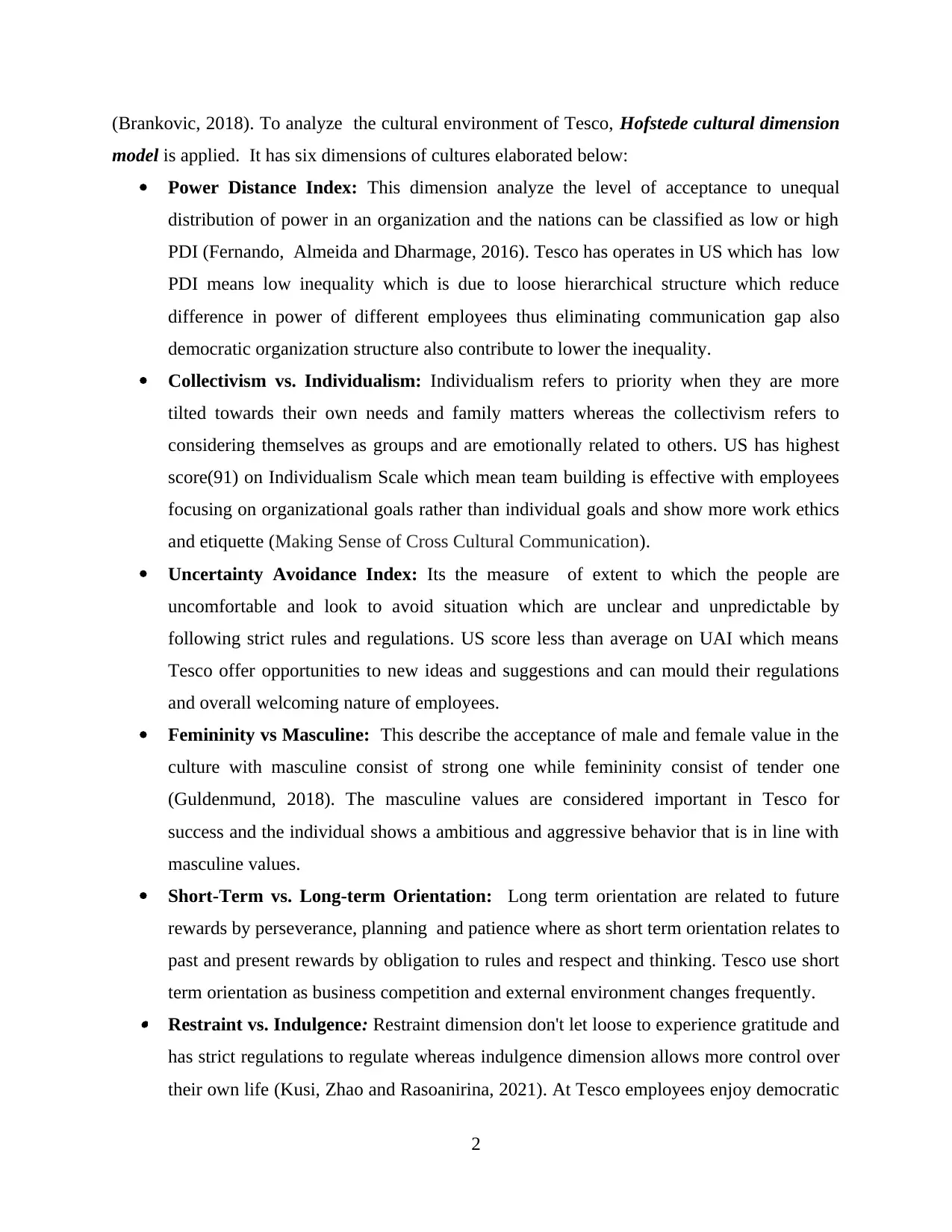
(Brankovic, 2018). To analyze the cultural environment of Tesco, Hofstede cultural dimension
model is applied. It has six dimensions of cultures elaborated below:
Power Distance Index: This dimension analyze the level of acceptance to unequal
distribution of power in an organization and the nations can be classified as low or high
PDI (Fernando, Almeida and Dharmage, 2016). Tesco has operates in US which has low
PDI means low inequality which is due to loose hierarchical structure which reduce
difference in power of different employees thus eliminating communication gap also
democratic organization structure also contribute to lower the inequality.
Collectivism vs. Individualism: Individualism refers to priority when they are more
tilted towards their own needs and family matters whereas the collectivism refers to
considering themselves as groups and are emotionally related to others. US has highest
score(91) on Individualism Scale which mean team building is effective with employees
focusing on organizational goals rather than individual goals and show more work ethics
and etiquette (Making Sense of Cross Cultural Communication).
Uncertainty Avoidance Index: Its the measure of extent to which the people are
uncomfortable and look to avoid situation which are unclear and unpredictable by
following strict rules and regulations. US score less than average on UAI which means
Tesco offer opportunities to new ideas and suggestions and can mould their regulations
and overall welcoming nature of employees.
Femininity vs Masculine: This describe the acceptance of male and female value in the
culture with masculine consist of strong one while femininity consist of tender one
(Guldenmund, 2018). The masculine values are considered important in Tesco for
success and the individual shows a ambitious and aggressive behavior that is in line with
masculine values.
Short-Term vs. Long-term Orientation: Long term orientation are related to future
rewards by perseverance, planning and patience where as short term orientation relates to
past and present rewards by obligation to rules and respect and thinking. Tesco use short
term orientation as business competition and external environment changes frequently. Restraint vs. Indulgence: Restraint dimension don't let loose to experience gratitude and
has strict regulations to regulate whereas indulgence dimension allows more control over
their own life (Kusi, Zhao and Rasoanirina, 2021). At Tesco employees enjoy democratic
2
model is applied. It has six dimensions of cultures elaborated below:
Power Distance Index: This dimension analyze the level of acceptance to unequal
distribution of power in an organization and the nations can be classified as low or high
PDI (Fernando, Almeida and Dharmage, 2016). Tesco has operates in US which has low
PDI means low inequality which is due to loose hierarchical structure which reduce
difference in power of different employees thus eliminating communication gap also
democratic organization structure also contribute to lower the inequality.
Collectivism vs. Individualism: Individualism refers to priority when they are more
tilted towards their own needs and family matters whereas the collectivism refers to
considering themselves as groups and are emotionally related to others. US has highest
score(91) on Individualism Scale which mean team building is effective with employees
focusing on organizational goals rather than individual goals and show more work ethics
and etiquette (Making Sense of Cross Cultural Communication).
Uncertainty Avoidance Index: Its the measure of extent to which the people are
uncomfortable and look to avoid situation which are unclear and unpredictable by
following strict rules and regulations. US score less than average on UAI which means
Tesco offer opportunities to new ideas and suggestions and can mould their regulations
and overall welcoming nature of employees.
Femininity vs Masculine: This describe the acceptance of male and female value in the
culture with masculine consist of strong one while femininity consist of tender one
(Guldenmund, 2018). The masculine values are considered important in Tesco for
success and the individual shows a ambitious and aggressive behavior that is in line with
masculine values.
Short-Term vs. Long-term Orientation: Long term orientation are related to future
rewards by perseverance, planning and patience where as short term orientation relates to
past and present rewards by obligation to rules and respect and thinking. Tesco use short
term orientation as business competition and external environment changes frequently. Restraint vs. Indulgence: Restraint dimension don't let loose to experience gratitude and
has strict regulations to regulate whereas indulgence dimension allows more control over
their own life (Kusi, Zhao and Rasoanirina, 2021). At Tesco employees enjoy democratic
2
Paraphrase This Document
Need a fresh take? Get an instant paraphrase of this document with our AI Paraphraser
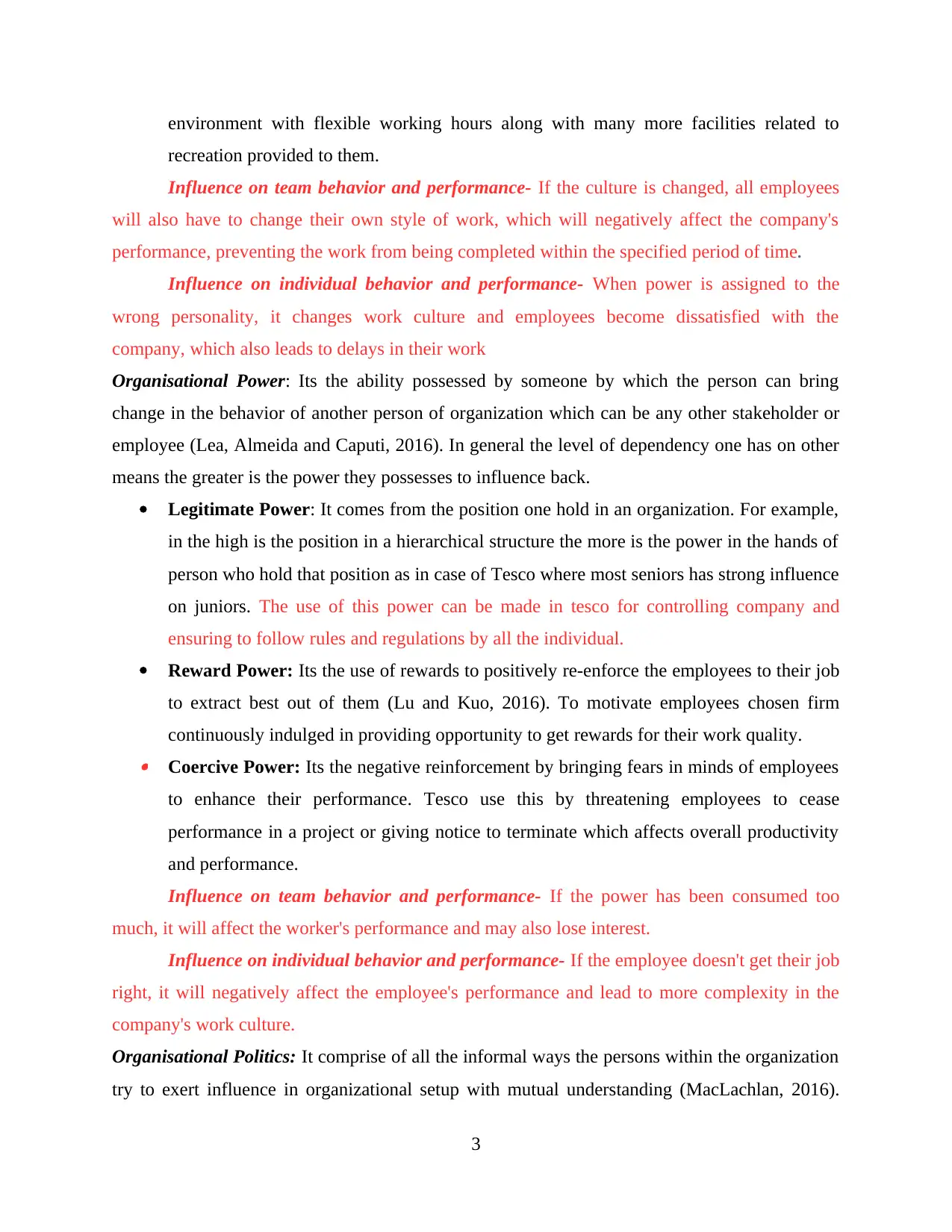
environment with flexible working hours along with many more facilities related to
recreation provided to them.
Influence on team behavior and performance- If the culture is changed, all employees
will also have to change their own style of work, which will negatively affect the company's
performance, preventing the work from being completed within the specified period of time.
Influence on individual behavior and performance- When power is assigned to the
wrong personality, it changes work culture and employees become dissatisfied with the
company, which also leads to delays in their work
Organisational Power: Its the ability possessed by someone by which the person can bring
change in the behavior of another person of organization which can be any other stakeholder or
employee (Lea, Almeida and Caputi, 2016). In general the level of dependency one has on other
means the greater is the power they possesses to influence back.
Legitimate Power: It comes from the position one hold in an organization. For example,
in the high is the position in a hierarchical structure the more is the power in the hands of
person who hold that position as in case of Tesco where most seniors has strong influence
on juniors. The use of this power can be made in tesco for controlling company and
ensuring to follow rules and regulations by all the individual.
Reward Power: Its the use of rewards to positively re-enforce the employees to their job
to extract best out of them (Lu and Kuo, 2016). To motivate employees chosen firm
continuously indulged in providing opportunity to get rewards for their work quality. Coercive Power: Its the negative reinforcement by bringing fears in minds of employees
to enhance their performance. Tesco use this by threatening employees to cease
performance in a project or giving notice to terminate which affects overall productivity
and performance.
Influence on team behavior and performance- If the power has been consumed too
much, it will affect the worker's performance and may also lose interest.
Influence on individual behavior and performance- If the employee doesn't get their job
right, it will negatively affect the employee's performance and lead to more complexity in the
company's work culture.
Organisational Politics: It comprise of all the informal ways the persons within the organization
try to exert influence in organizational setup with mutual understanding (MacLachlan, 2016).
3
recreation provided to them.
Influence on team behavior and performance- If the culture is changed, all employees
will also have to change their own style of work, which will negatively affect the company's
performance, preventing the work from being completed within the specified period of time.
Influence on individual behavior and performance- When power is assigned to the
wrong personality, it changes work culture and employees become dissatisfied with the
company, which also leads to delays in their work
Organisational Power: Its the ability possessed by someone by which the person can bring
change in the behavior of another person of organization which can be any other stakeholder or
employee (Lea, Almeida and Caputi, 2016). In general the level of dependency one has on other
means the greater is the power they possesses to influence back.
Legitimate Power: It comes from the position one hold in an organization. For example,
in the high is the position in a hierarchical structure the more is the power in the hands of
person who hold that position as in case of Tesco where most seniors has strong influence
on juniors. The use of this power can be made in tesco for controlling company and
ensuring to follow rules and regulations by all the individual.
Reward Power: Its the use of rewards to positively re-enforce the employees to their job
to extract best out of them (Lu and Kuo, 2016). To motivate employees chosen firm
continuously indulged in providing opportunity to get rewards for their work quality. Coercive Power: Its the negative reinforcement by bringing fears in minds of employees
to enhance their performance. Tesco use this by threatening employees to cease
performance in a project or giving notice to terminate which affects overall productivity
and performance.
Influence on team behavior and performance- If the power has been consumed too
much, it will affect the worker's performance and may also lose interest.
Influence on individual behavior and performance- If the employee doesn't get their job
right, it will negatively affect the employee's performance and lead to more complexity in the
company's work culture.
Organisational Politics: It comprise of all the informal ways the persons within the organization
try to exert influence in organizational setup with mutual understanding (MacLachlan, 2016).
3
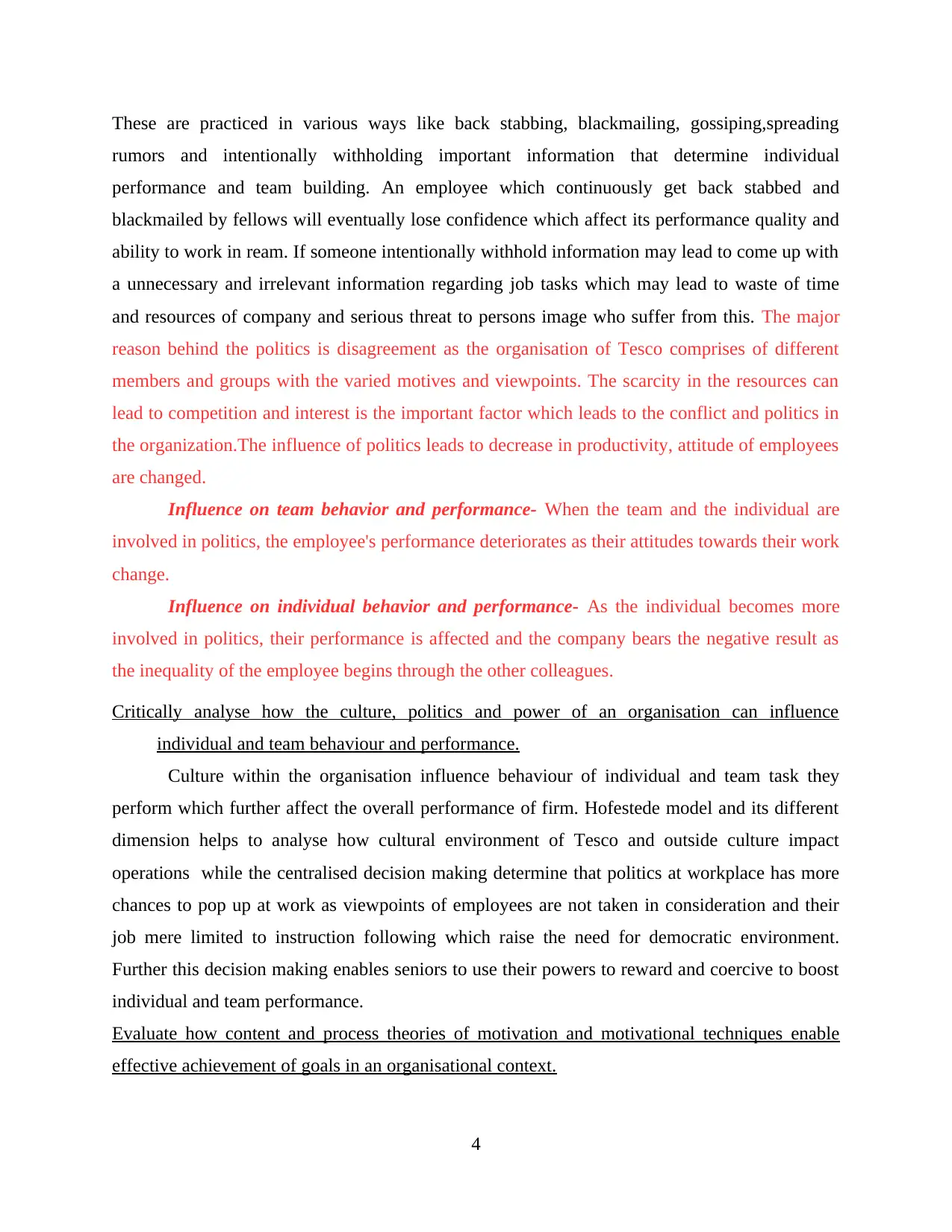
These are practiced in various ways like back stabbing, blackmailing, gossiping,spreading
rumors and intentionally withholding important information that determine individual
performance and team building. An employee which continuously get back stabbed and
blackmailed by fellows will eventually lose confidence which affect its performance quality and
ability to work in ream. If someone intentionally withhold information may lead to come up with
a unnecessary and irrelevant information regarding job tasks which may lead to waste of time
and resources of company and serious threat to persons image who suffer from this. The major
reason behind the politics is disagreement as the organisation of Tesco comprises of different
members and groups with the varied motives and viewpoints. The scarcity in the resources can
lead to competition and interest is the important factor which leads to the conflict and politics in
the organization.The influence of politics leads to decrease in productivity, attitude of employees
are changed.
Influence on team behavior and performance- When the team and the individual are
involved in politics, the employee's performance deteriorates as their attitudes towards their work
change.
Influence on individual behavior and performance- As the individual becomes more
involved in politics, their performance is affected and the company bears the negative result as
the inequality of the employee begins through the other colleagues.
Critically analyse how the culture, politics and power of an organisation can influence
individual and team behaviour and performance.
Culture within the organisation influence behaviour of individual and team task they
perform which further affect the overall performance of firm. Hofestede model and its different
dimension helps to analyse how cultural environment of Tesco and outside culture impact
operations while the centralised decision making determine that politics at workplace has more
chances to pop up at work as viewpoints of employees are not taken in consideration and their
job mere limited to instruction following which raise the need for democratic environment.
Further this decision making enables seniors to use their powers to reward and coercive to boost
individual and team performance.
Evaluate how content and process theories of motivation and motivational techniques enable
effective achievement of goals in an organisational context.
4
rumors and intentionally withholding important information that determine individual
performance and team building. An employee which continuously get back stabbed and
blackmailed by fellows will eventually lose confidence which affect its performance quality and
ability to work in ream. If someone intentionally withhold information may lead to come up with
a unnecessary and irrelevant information regarding job tasks which may lead to waste of time
and resources of company and serious threat to persons image who suffer from this. The major
reason behind the politics is disagreement as the organisation of Tesco comprises of different
members and groups with the varied motives and viewpoints. The scarcity in the resources can
lead to competition and interest is the important factor which leads to the conflict and politics in
the organization.The influence of politics leads to decrease in productivity, attitude of employees
are changed.
Influence on team behavior and performance- When the team and the individual are
involved in politics, the employee's performance deteriorates as their attitudes towards their work
change.
Influence on individual behavior and performance- As the individual becomes more
involved in politics, their performance is affected and the company bears the negative result as
the inequality of the employee begins through the other colleagues.
Critically analyse how the culture, politics and power of an organisation can influence
individual and team behaviour and performance.
Culture within the organisation influence behaviour of individual and team task they
perform which further affect the overall performance of firm. Hofestede model and its different
dimension helps to analyse how cultural environment of Tesco and outside culture impact
operations while the centralised decision making determine that politics at workplace has more
chances to pop up at work as viewpoints of employees are not taken in consideration and their
job mere limited to instruction following which raise the need for democratic environment.
Further this decision making enables seniors to use their powers to reward and coercive to boost
individual and team performance.
Evaluate how content and process theories of motivation and motivational techniques enable
effective achievement of goals in an organisational context.
4
⊘ This is a preview!⊘
Do you want full access?
Subscribe today to unlock all pages.

Trusted by 1+ million students worldwide
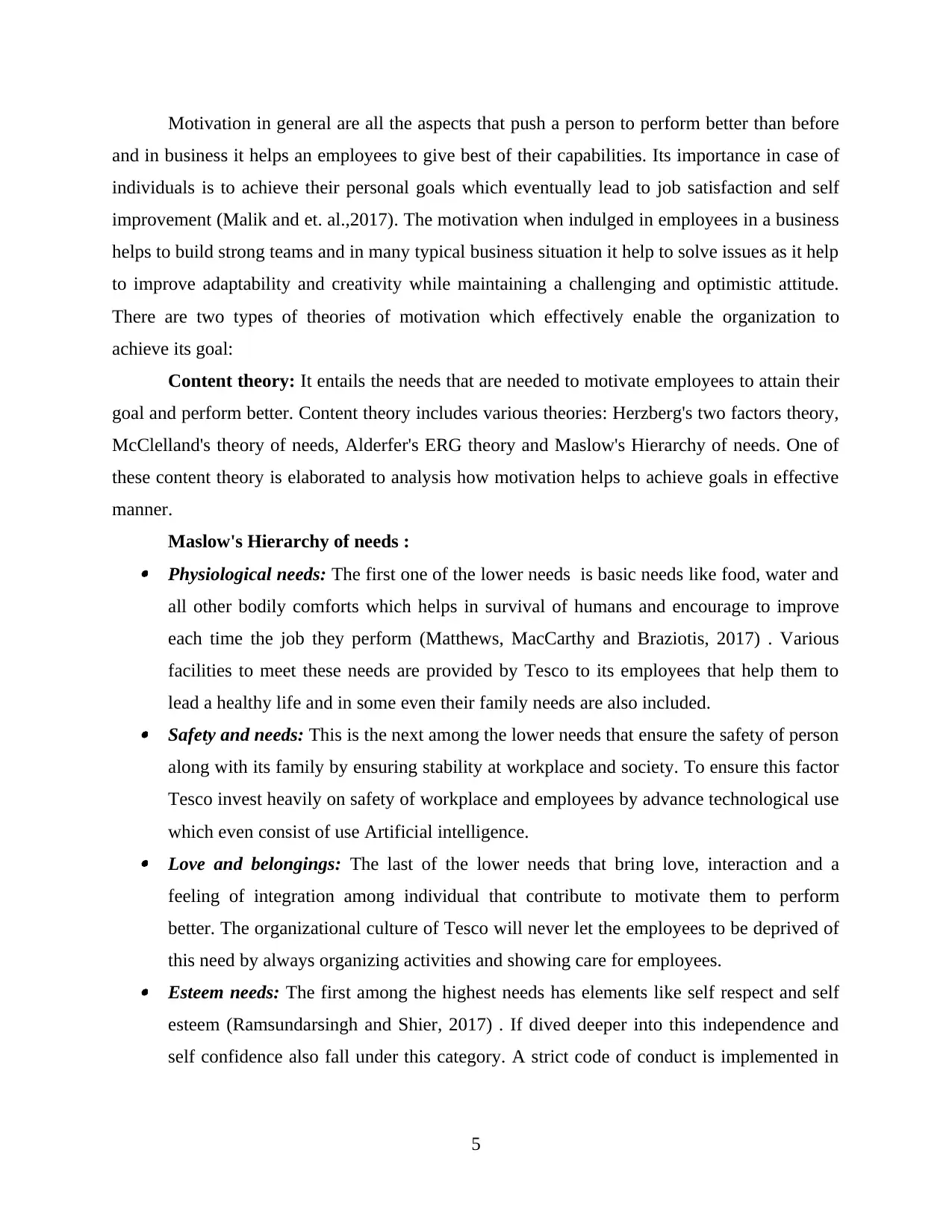
Motivation in general are all the aspects that push a person to perform better than before
and in business it helps an employees to give best of their capabilities. Its importance in case of
individuals is to achieve their personal goals which eventually lead to job satisfaction and self
improvement (Malik and et. al.,2017). The motivation when indulged in employees in a business
helps to build strong teams and in many typical business situation it help to solve issues as it help
to improve adaptability and creativity while maintaining a challenging and optimistic attitude.
There are two types of theories of motivation which effectively enable the organization to
achieve its goal:
Content theory: It entails the needs that are needed to motivate employees to attain their
goal and perform better. Content theory includes various theories: Herzberg's two factors theory,
McClelland's theory of needs, Alderfer's ERG theory and Maslow's Hierarchy of needs. One of
these content theory is elaborated to analysis how motivation helps to achieve goals in effective
manner.
Maslow's Hierarchy of needs : Physiological needs: The first one of the lower needs is basic needs like food, water and
all other bodily comforts which helps in survival of humans and encourage to improve
each time the job they perform (Matthews, MacCarthy and Braziotis, 2017) . Various
facilities to meet these needs are provided by Tesco to its employees that help them to
lead a healthy life and in some even their family needs are also included. Safety and needs: This is the next among the lower needs that ensure the safety of person
along with its family by ensuring stability at workplace and society. To ensure this factor
Tesco invest heavily on safety of workplace and employees by advance technological use
which even consist of use Artificial intelligence. Love and belongings: The last of the lower needs that bring love, interaction and a
feeling of integration among individual that contribute to motivate them to perform
better. The organizational culture of Tesco will never let the employees to be deprived of
this need by always organizing activities and showing care for employees. Esteem needs: The first among the highest needs has elements like self respect and self
esteem (Ramsundarsingh and Shier, 2017) . If dived deeper into this independence and
self confidence also fall under this category. A strict code of conduct is implemented in
5
and in business it helps an employees to give best of their capabilities. Its importance in case of
individuals is to achieve their personal goals which eventually lead to job satisfaction and self
improvement (Malik and et. al.,2017). The motivation when indulged in employees in a business
helps to build strong teams and in many typical business situation it help to solve issues as it help
to improve adaptability and creativity while maintaining a challenging and optimistic attitude.
There are two types of theories of motivation which effectively enable the organization to
achieve its goal:
Content theory: It entails the needs that are needed to motivate employees to attain their
goal and perform better. Content theory includes various theories: Herzberg's two factors theory,
McClelland's theory of needs, Alderfer's ERG theory and Maslow's Hierarchy of needs. One of
these content theory is elaborated to analysis how motivation helps to achieve goals in effective
manner.
Maslow's Hierarchy of needs : Physiological needs: The first one of the lower needs is basic needs like food, water and
all other bodily comforts which helps in survival of humans and encourage to improve
each time the job they perform (Matthews, MacCarthy and Braziotis, 2017) . Various
facilities to meet these needs are provided by Tesco to its employees that help them to
lead a healthy life and in some even their family needs are also included. Safety and needs: This is the next among the lower needs that ensure the safety of person
along with its family by ensuring stability at workplace and society. To ensure this factor
Tesco invest heavily on safety of workplace and employees by advance technological use
which even consist of use Artificial intelligence. Love and belongings: The last of the lower needs that bring love, interaction and a
feeling of integration among individual that contribute to motivate them to perform
better. The organizational culture of Tesco will never let the employees to be deprived of
this need by always organizing activities and showing care for employees. Esteem needs: The first among the highest needs has elements like self respect and self
esteem (Ramsundarsingh and Shier, 2017) . If dived deeper into this independence and
self confidence also fall under this category. A strict code of conduct is implemented in
5
Paraphrase This Document
Need a fresh take? Get an instant paraphrase of this document with our AI Paraphraser
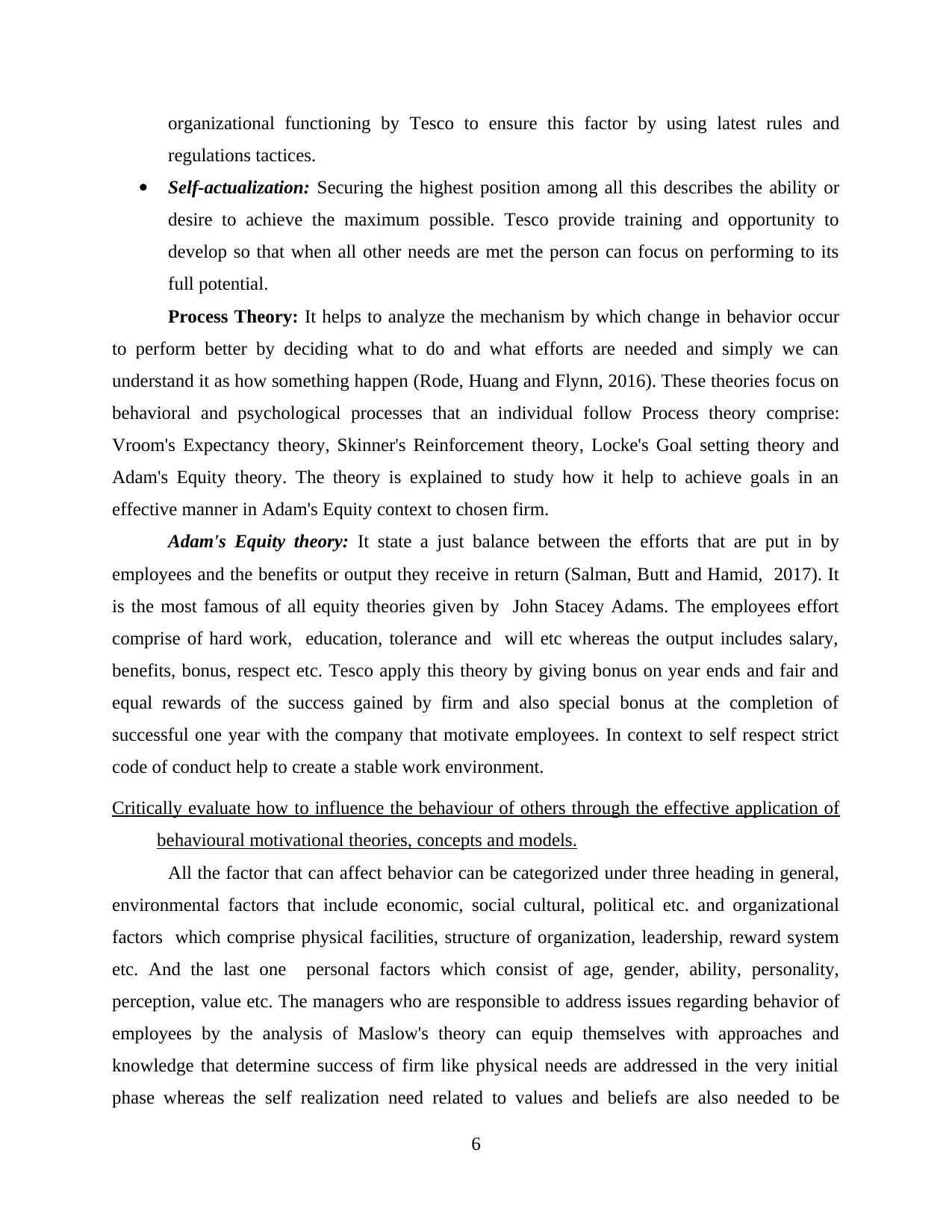
organizational functioning by Tesco to ensure this factor by using latest rules and
regulations tactices.
Self-actualization: Securing the highest position among all this describes the ability or
desire to achieve the maximum possible. Tesco provide training and opportunity to
develop so that when all other needs are met the person can focus on performing to its
full potential.
Process Theory: It helps to analyze the mechanism by which change in behavior occur
to perform better by deciding what to do and what efforts are needed and simply we can
understand it as how something happen (Rode, Huang and Flynn, 2016). These theories focus on
behavioral and psychological processes that an individual follow Process theory comprise:
Vroom's Expectancy theory, Skinner's Reinforcement theory, Locke's Goal setting theory and
Adam's Equity theory. The theory is explained to study how it help to achieve goals in an
effective manner in Adam's Equity context to chosen firm.
Adam's Equity theory: It state a just balance between the efforts that are put in by
employees and the benefits or output they receive in return (Salman, Butt and Hamid, 2017). It
is the most famous of all equity theories given by John Stacey Adams. The employees effort
comprise of hard work, education, tolerance and will etc whereas the output includes salary,
benefits, bonus, respect etc. Tesco apply this theory by giving bonus on year ends and fair and
equal rewards of the success gained by firm and also special bonus at the completion of
successful one year with the company that motivate employees. In context to self respect strict
code of conduct help to create a stable work environment.
Critically evaluate how to influence the behaviour of others through the effective application of
behavioural motivational theories, concepts and models.
All the factor that can affect behavior can be categorized under three heading in general,
environmental factors that include economic, social cultural, political etc. and organizational
factors which comprise physical facilities, structure of organization, leadership, reward system
etc. And the last one personal factors which consist of age, gender, ability, personality,
perception, value etc. The managers who are responsible to address issues regarding behavior of
employees by the analysis of Maslow's theory can equip themselves with approaches and
knowledge that determine success of firm like physical needs are addressed in the very initial
phase whereas the self realization need related to values and beliefs are also needed to be
6
regulations tactices.
Self-actualization: Securing the highest position among all this describes the ability or
desire to achieve the maximum possible. Tesco provide training and opportunity to
develop so that when all other needs are met the person can focus on performing to its
full potential.
Process Theory: It helps to analyze the mechanism by which change in behavior occur
to perform better by deciding what to do and what efforts are needed and simply we can
understand it as how something happen (Rode, Huang and Flynn, 2016). These theories focus on
behavioral and psychological processes that an individual follow Process theory comprise:
Vroom's Expectancy theory, Skinner's Reinforcement theory, Locke's Goal setting theory and
Adam's Equity theory. The theory is explained to study how it help to achieve goals in an
effective manner in Adam's Equity context to chosen firm.
Adam's Equity theory: It state a just balance between the efforts that are put in by
employees and the benefits or output they receive in return (Salman, Butt and Hamid, 2017). It
is the most famous of all equity theories given by John Stacey Adams. The employees effort
comprise of hard work, education, tolerance and will etc whereas the output includes salary,
benefits, bonus, respect etc. Tesco apply this theory by giving bonus on year ends and fair and
equal rewards of the success gained by firm and also special bonus at the completion of
successful one year with the company that motivate employees. In context to self respect strict
code of conduct help to create a stable work environment.
Critically evaluate how to influence the behaviour of others through the effective application of
behavioural motivational theories, concepts and models.
All the factor that can affect behavior can be categorized under three heading in general,
environmental factors that include economic, social cultural, political etc. and organizational
factors which comprise physical facilities, structure of organization, leadership, reward system
etc. And the last one personal factors which consist of age, gender, ability, personality,
perception, value etc. The managers who are responsible to address issues regarding behavior of
employees by the analysis of Maslow's theory can equip themselves with approaches and
knowledge that determine success of firm like physical needs are addressed in the very initial
phase whereas the self realization need related to values and beliefs are also needed to be
6
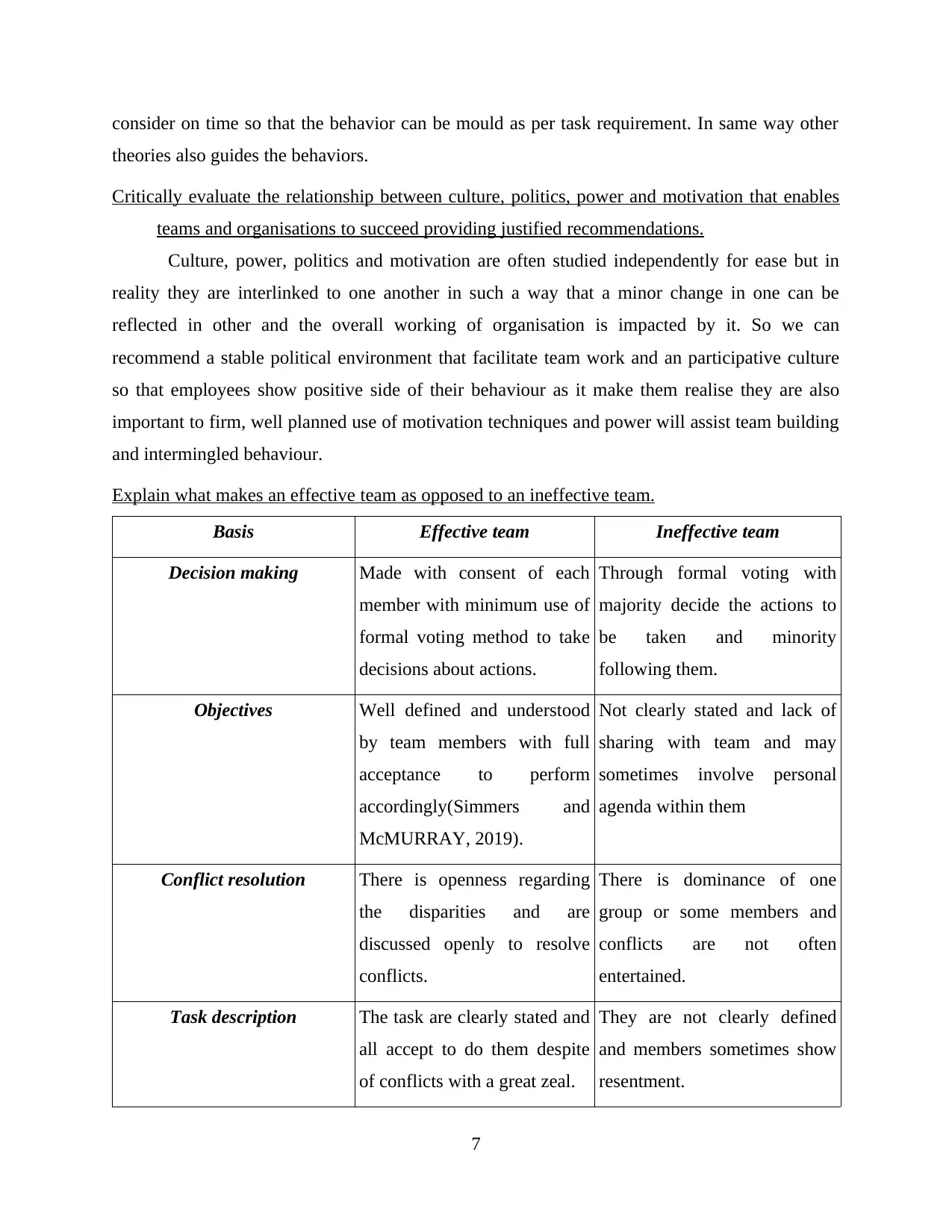
consider on time so that the behavior can be mould as per task requirement. In same way other
theories also guides the behaviors.
Critically evaluate the relationship between culture, politics, power and motivation that enables
teams and organisations to succeed providing justified recommendations.
Culture, power, politics and motivation are often studied independently for ease but in
reality they are interlinked to one another in such a way that a minor change in one can be
reflected in other and the overall working of organisation is impacted by it. So we can
recommend a stable political environment that facilitate team work and an participative culture
so that employees show positive side of their behaviour as it make them realise they are also
important to firm, well planned use of motivation techniques and power will assist team building
and intermingled behaviour.
Explain what makes an effective team as opposed to an ineffective team.
Basis Effective team Ineffective team
Decision making Made with consent of each
member with minimum use of
formal voting method to take
decisions about actions.
Through formal voting with
majority decide the actions to
be taken and minority
following them.
Objectives Well defined and understood
by team members with full
acceptance to perform
accordingly(Simmers and
McMURRAY, 2019).
Not clearly stated and lack of
sharing with team and may
sometimes involve personal
agenda within them
Conflict resolution There is openness regarding
the disparities and are
discussed openly to resolve
conflicts.
There is dominance of one
group or some members and
conflicts are not often
entertained.
Task description The task are clearly stated and
all accept to do them despite
of conflicts with a great zeal.
They are not clearly defined
and members sometimes show
resentment.
7
theories also guides the behaviors.
Critically evaluate the relationship between culture, politics, power and motivation that enables
teams and organisations to succeed providing justified recommendations.
Culture, power, politics and motivation are often studied independently for ease but in
reality they are interlinked to one another in such a way that a minor change in one can be
reflected in other and the overall working of organisation is impacted by it. So we can
recommend a stable political environment that facilitate team work and an participative culture
so that employees show positive side of their behaviour as it make them realise they are also
important to firm, well planned use of motivation techniques and power will assist team building
and intermingled behaviour.
Explain what makes an effective team as opposed to an ineffective team.
Basis Effective team Ineffective team
Decision making Made with consent of each
member with minimum use of
formal voting method to take
decisions about actions.
Through formal voting with
majority decide the actions to
be taken and minority
following them.
Objectives Well defined and understood
by team members with full
acceptance to perform
accordingly(Simmers and
McMURRAY, 2019).
Not clearly stated and lack of
sharing with team and may
sometimes involve personal
agenda within them
Conflict resolution There is openness regarding
the disparities and are
discussed openly to resolve
conflicts.
There is dominance of one
group or some members and
conflicts are not often
entertained.
Task description The task are clearly stated and
all accept to do them despite
of conflicts with a great zeal.
They are not clearly defined
and members sometimes show
resentment.
7
⊘ This is a preview!⊘
Do you want full access?
Subscribe today to unlock all pages.

Trusted by 1+ million students worldwide
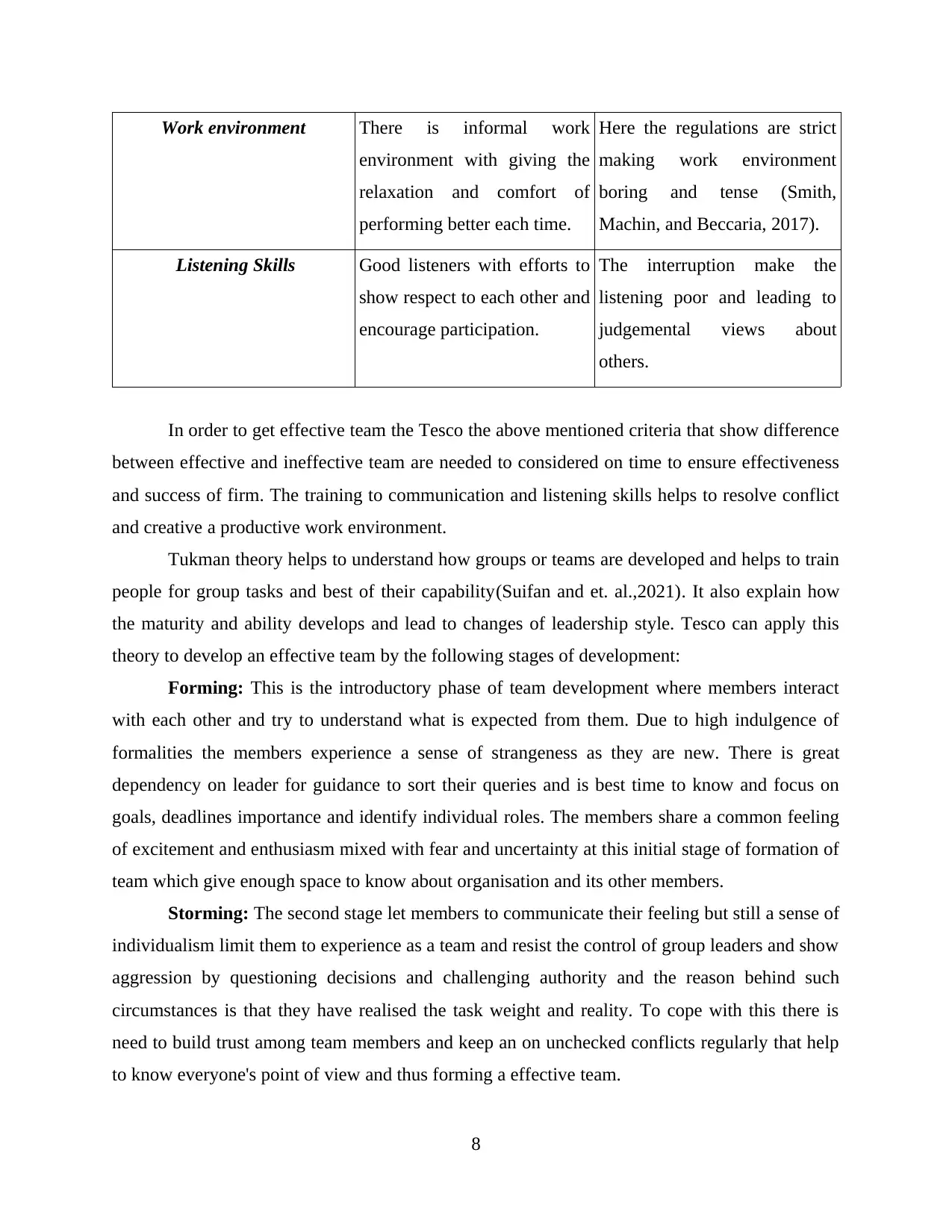
Work environment There is informal work
environment with giving the
relaxation and comfort of
performing better each time.
Here the regulations are strict
making work environment
boring and tense (Smith,
Machin, and Beccaria, 2017).
Listening Skills Good listeners with efforts to
show respect to each other and
encourage participation.
The interruption make the
listening poor and leading to
judgemental views about
others.
In order to get effective team the Tesco the above mentioned criteria that show difference
between effective and ineffective team are needed to considered on time to ensure effectiveness
and success of firm. The training to communication and listening skills helps to resolve conflict
and creative a productive work environment.
Tukman theory helps to understand how groups or teams are developed and helps to train
people for group tasks and best of their capability(Suifan and et. al.,2021). It also explain how
the maturity and ability develops and lead to changes of leadership style. Tesco can apply this
theory to develop an effective team by the following stages of development:
Forming: This is the introductory phase of team development where members interact
with each other and try to understand what is expected from them. Due to high indulgence of
formalities the members experience a sense of strangeness as they are new. There is great
dependency on leader for guidance to sort their queries and is best time to know and focus on
goals, deadlines importance and identify individual roles. The members share a common feeling
of excitement and enthusiasm mixed with fear and uncertainty at this initial stage of formation of
team which give enough space to know about organisation and its other members.
Storming: The second stage let members to communicate their feeling but still a sense of
individualism limit them to experience as a team and resist the control of group leaders and show
aggression by questioning decisions and challenging authority and the reason behind such
circumstances is that they have realised the task weight and reality. To cope with this there is
need to build trust among team members and keep an on unchecked conflicts regularly that help
to know everyone's point of view and thus forming a effective team.
8
environment with giving the
relaxation and comfort of
performing better each time.
Here the regulations are strict
making work environment
boring and tense (Smith,
Machin, and Beccaria, 2017).
Listening Skills Good listeners with efforts to
show respect to each other and
encourage participation.
The interruption make the
listening poor and leading to
judgemental views about
others.
In order to get effective team the Tesco the above mentioned criteria that show difference
between effective and ineffective team are needed to considered on time to ensure effectiveness
and success of firm. The training to communication and listening skills helps to resolve conflict
and creative a productive work environment.
Tukman theory helps to understand how groups or teams are developed and helps to train
people for group tasks and best of their capability(Suifan and et. al.,2021). It also explain how
the maturity and ability develops and lead to changes of leadership style. Tesco can apply this
theory to develop an effective team by the following stages of development:
Forming: This is the introductory phase of team development where members interact
with each other and try to understand what is expected from them. Due to high indulgence of
formalities the members experience a sense of strangeness as they are new. There is great
dependency on leader for guidance to sort their queries and is best time to know and focus on
goals, deadlines importance and identify individual roles. The members share a common feeling
of excitement and enthusiasm mixed with fear and uncertainty at this initial stage of formation of
team which give enough space to know about organisation and its other members.
Storming: The second stage let members to communicate their feeling but still a sense of
individualism limit them to experience as a team and resist the control of group leaders and show
aggression by questioning decisions and challenging authority and the reason behind such
circumstances is that they have realised the task weight and reality. To cope with this there is
need to build trust among team members and keep an on unchecked conflicts regularly that help
to know everyone's point of view and thus forming a effective team.
8
Paraphrase This Document
Need a fresh take? Get an instant paraphrase of this document with our AI Paraphraser
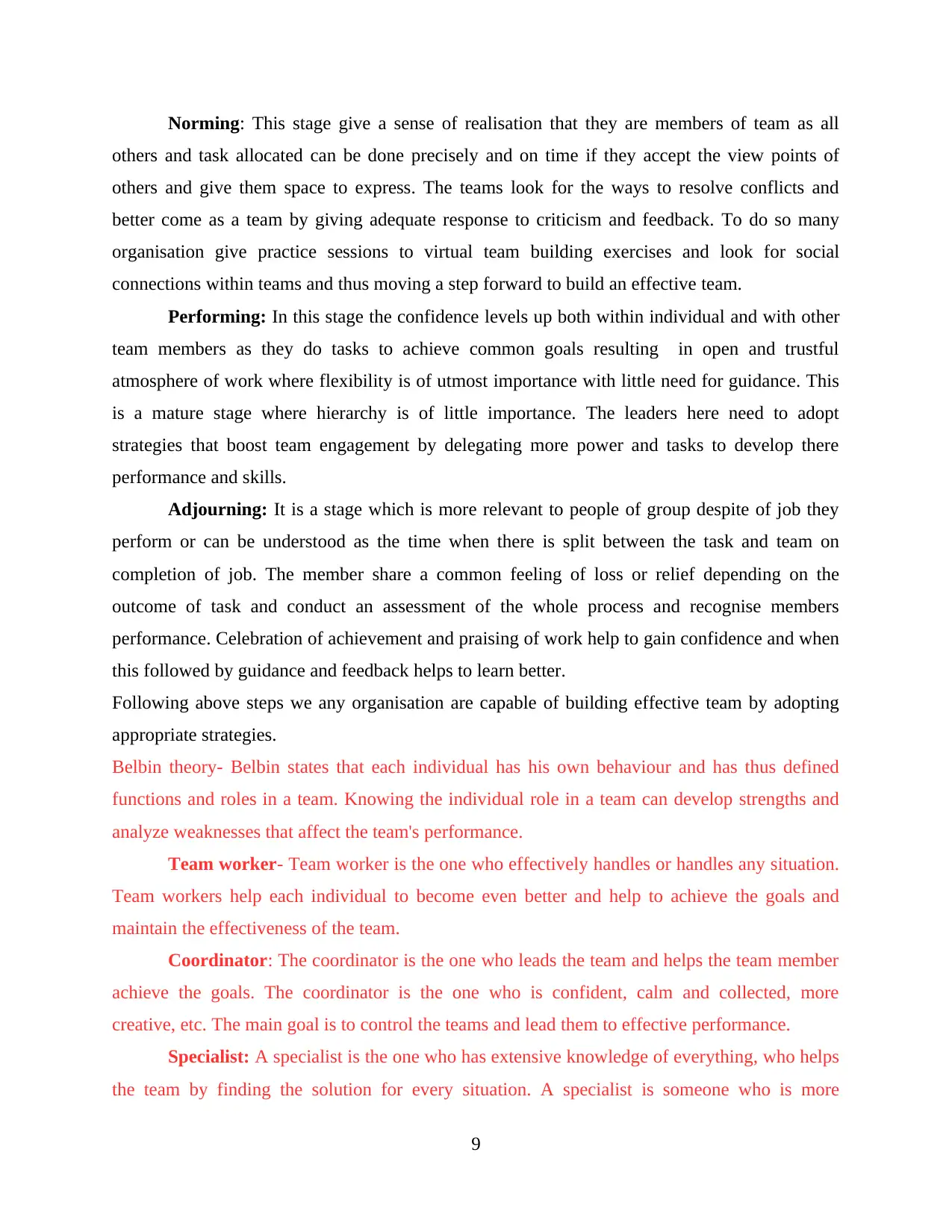
Norming: This stage give a sense of realisation that they are members of team as all
others and task allocated can be done precisely and on time if they accept the view points of
others and give them space to express. The teams look for the ways to resolve conflicts and
better come as a team by giving adequate response to criticism and feedback. To do so many
organisation give practice sessions to virtual team building exercises and look for social
connections within teams and thus moving a step forward to build an effective team.
Performing: In this stage the confidence levels up both within individual and with other
team members as they do tasks to achieve common goals resulting in open and trustful
atmosphere of work where flexibility is of utmost importance with little need for guidance. This
is a mature stage where hierarchy is of little importance. The leaders here need to adopt
strategies that boost team engagement by delegating more power and tasks to develop there
performance and skills.
Adjourning: It is a stage which is more relevant to people of group despite of job they
perform or can be understood as the time when there is split between the task and team on
completion of job. The member share a common feeling of loss or relief depending on the
outcome of task and conduct an assessment of the whole process and recognise members
performance. Celebration of achievement and praising of work help to gain confidence and when
this followed by guidance and feedback helps to learn better.
Following above steps we any organisation are capable of building effective team by adopting
appropriate strategies.
Belbin theory- Belbin states that each individual has his own behaviour and has thus defined
functions and roles in a team. Knowing the individual role in a team can develop strengths and
analyze weaknesses that affect the team's performance.
Team worker- Team worker is the one who effectively handles or handles any situation.
Team workers help each individual to become even better and help to achieve the goals and
maintain the effectiveness of the team.
Coordinator: The coordinator is the one who leads the team and helps the team member
achieve the goals. The coordinator is the one who is confident, calm and collected, more
creative, etc. The main goal is to control the teams and lead them to effective performance.
Specialist: A specialist is the one who has extensive knowledge of everything, who helps
the team by finding the solution for every situation. A specialist is someone who is more
9
others and task allocated can be done precisely and on time if they accept the view points of
others and give them space to express. The teams look for the ways to resolve conflicts and
better come as a team by giving adequate response to criticism and feedback. To do so many
organisation give practice sessions to virtual team building exercises and look for social
connections within teams and thus moving a step forward to build an effective team.
Performing: In this stage the confidence levels up both within individual and with other
team members as they do tasks to achieve common goals resulting in open and trustful
atmosphere of work where flexibility is of utmost importance with little need for guidance. This
is a mature stage where hierarchy is of little importance. The leaders here need to adopt
strategies that boost team engagement by delegating more power and tasks to develop there
performance and skills.
Adjourning: It is a stage which is more relevant to people of group despite of job they
perform or can be understood as the time when there is split between the task and team on
completion of job. The member share a common feeling of loss or relief depending on the
outcome of task and conduct an assessment of the whole process and recognise members
performance. Celebration of achievement and praising of work help to gain confidence and when
this followed by guidance and feedback helps to learn better.
Following above steps we any organisation are capable of building effective team by adopting
appropriate strategies.
Belbin theory- Belbin states that each individual has his own behaviour and has thus defined
functions and roles in a team. Knowing the individual role in a team can develop strengths and
analyze weaknesses that affect the team's performance.
Team worker- Team worker is the one who effectively handles or handles any situation.
Team workers help each individual to become even better and help to achieve the goals and
maintain the effectiveness of the team.
Coordinator: The coordinator is the one who leads the team and helps the team member
achieve the goals. The coordinator is the one who is confident, calm and collected, more
creative, etc. The main goal is to control the teams and lead them to effective performance.
Specialist: A specialist is the one who has extensive knowledge of everything, who helps
the team by finding the solution for every situation. A specialist is someone who is more
9
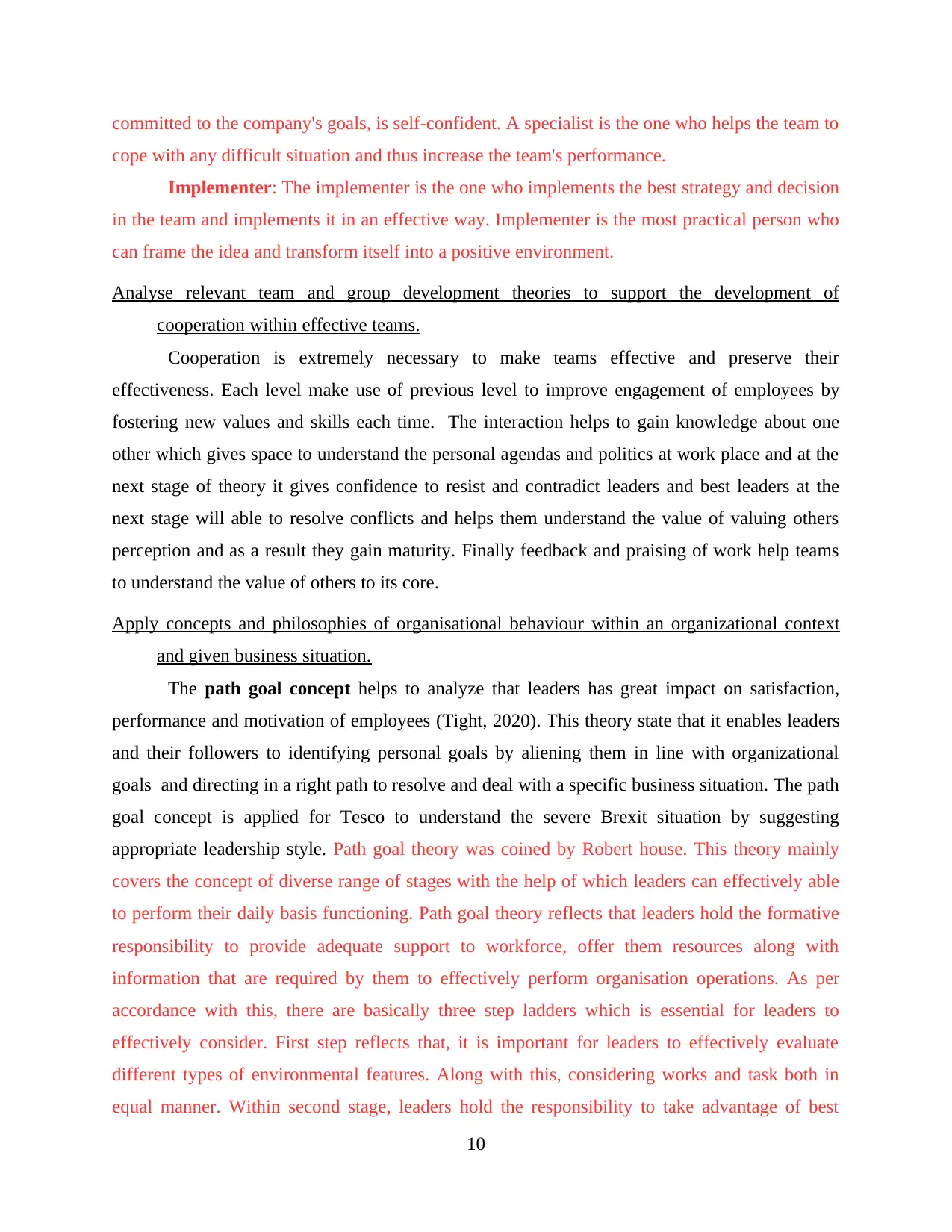
committed to the company's goals, is self-confident. A specialist is the one who helps the team to
cope with any difficult situation and thus increase the team's performance.
Implementer: The implementer is the one who implements the best strategy and decision
in the team and implements it in an effective way. Implementer is the most practical person who
can frame the idea and transform itself into a positive environment.
Analyse relevant team and group development theories to support the development of
cooperation within effective teams.
Cooperation is extremely necessary to make teams effective and preserve their
effectiveness. Each level make use of previous level to improve engagement of employees by
fostering new values and skills each time. The interaction helps to gain knowledge about one
other which gives space to understand the personal agendas and politics at work place and at the
next stage of theory it gives confidence to resist and contradict leaders and best leaders at the
next stage will able to resolve conflicts and helps them understand the value of valuing others
perception and as a result they gain maturity. Finally feedback and praising of work help teams
to understand the value of others to its core.
Apply concepts and philosophies of organisational behaviour within an organizational context
and given business situation.
The path goal concept helps to analyze that leaders has great impact on satisfaction,
performance and motivation of employees (Tight, 2020). This theory state that it enables leaders
and their followers to identifying personal goals by aliening them in line with organizational
goals and directing in a right path to resolve and deal with a specific business situation. The path
goal concept is applied for Tesco to understand the severe Brexit situation by suggesting
appropriate leadership style. Path goal theory was coined by Robert house. This theory mainly
covers the concept of diverse range of stages with the help of which leaders can effectively able
to perform their daily basis functioning. Path goal theory reflects that leaders hold the formative
responsibility to provide adequate support to workforce, offer them resources along with
information that are required by them to effectively perform organisation operations. As per
accordance with this, there are basically three step ladders which is essential for leaders to
effectively consider. First step reflects that, it is important for leaders to effectively evaluate
different types of environmental features. Along with this, considering works and task both in
equal manner. Within second stage, leaders hold the responsibility to take advantage of best
10
cope with any difficult situation and thus increase the team's performance.
Implementer: The implementer is the one who implements the best strategy and decision
in the team and implements it in an effective way. Implementer is the most practical person who
can frame the idea and transform itself into a positive environment.
Analyse relevant team and group development theories to support the development of
cooperation within effective teams.
Cooperation is extremely necessary to make teams effective and preserve their
effectiveness. Each level make use of previous level to improve engagement of employees by
fostering new values and skills each time. The interaction helps to gain knowledge about one
other which gives space to understand the personal agendas and politics at work place and at the
next stage of theory it gives confidence to resist and contradict leaders and best leaders at the
next stage will able to resolve conflicts and helps them understand the value of valuing others
perception and as a result they gain maturity. Finally feedback and praising of work help teams
to understand the value of others to its core.
Apply concepts and philosophies of organisational behaviour within an organizational context
and given business situation.
The path goal concept helps to analyze that leaders has great impact on satisfaction,
performance and motivation of employees (Tight, 2020). This theory state that it enables leaders
and their followers to identifying personal goals by aliening them in line with organizational
goals and directing in a right path to resolve and deal with a specific business situation. The path
goal concept is applied for Tesco to understand the severe Brexit situation by suggesting
appropriate leadership style. Path goal theory was coined by Robert house. This theory mainly
covers the concept of diverse range of stages with the help of which leaders can effectively able
to perform their daily basis functioning. Path goal theory reflects that leaders hold the formative
responsibility to provide adequate support to workforce, offer them resources along with
information that are required by them to effectively perform organisation operations. As per
accordance with this, there are basically three step ladders which is essential for leaders to
effectively consider. First step reflects that, it is important for leaders to effectively evaluate
different types of environmental features. Along with this, considering works and task both in
equal manner. Within second stage, leaders hold the responsibility to take advantage of best
10
⊘ This is a preview!⊘
Do you want full access?
Subscribe today to unlock all pages.

Trusted by 1+ million students worldwide
1 out of 18
Related Documents
Your All-in-One AI-Powered Toolkit for Academic Success.
+13062052269
info@desklib.com
Available 24*7 on WhatsApp / Email
![[object Object]](/_next/static/media/star-bottom.7253800d.svg)
Unlock your academic potential
Copyright © 2020–2026 A2Z Services. All Rights Reserved. Developed and managed by ZUCOL.


